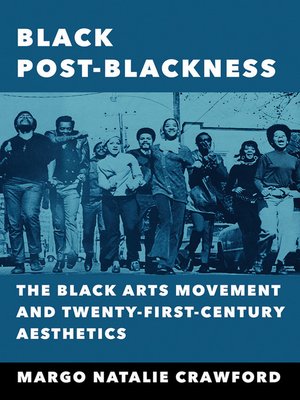Black Post-Blackness
ebook ∣ The Black Arts Movement and Twenty-First-Century Aesthetics · New Black Studies
By Margo Natalie Crawford

Sign up to save your library
With an OverDrive account, you can save your favorite libraries for at-a-glance information about availability. Find out more about OverDrive accounts.
Find this title in Libby, the library reading app by OverDrive.



Search for a digital library with this title
Title found at these libraries:
| Library Name | Distance |
|---|---|
| Loading... |
A 2008 cover of The New Yorker featured a much-discussed Black Power parody of Michelle and Barack Obama. The image put a spotlight on how easy it is to flatten the Black Power movement as we imagine new types of blackness. Margo Natalie Crawford argues that we have misread the Black Arts Movement's call for blackness. We have failed to see the movement's anticipation of the "new black" and "post-black." Black Post-Blackness compares the black avant-garde of the 1960s and 1970s Black Arts Movement with the most innovative spins of twenty-first century black aesthetics. Crawford zooms in on the 1970s second wave of the Black Arts Movement and shows the connections between this final wave of the Black Arts movement and the early years of twenty-first century black aesthetics. She uncovers the circle of black post-blackness that pivots on the power of anticipation, abstraction, mixed media, the global South, satire, public interiority, and the fantastic.|
Cover
Title
Contents
Acknowledgments
Introduction
1. The Aesthetics of Anticipation
2. The Politics of Abstraction
3. The Counter-Literacy of Black Mixed Media
4. The Local and the Global: BLKARTSOUTH and Callaloo
5. The Satire of Black Post-Blackness
6. Black Inside/Out: Public Interiority and Black Aesthetics
7. Who's Afraid of the Black Fantastic? The Substance of Surface
Epilogue: Feeling Black Post-Black
Notes
Index
|
"Black Post-Blackness moves rigorously with and against the grain of the most important work in black studies and performance studies, thereby joining it. In showing how blackness is unexhausted by the question of identity, Margo Natalie Crawford keeps its study on new, constantly renewed, persistently renewable footing."—Fred Moten, author of In the Break: The Aesthetics of the Black Radical Tradition
"An original and very important contribution to African American Studies, American literature, and African American thought. Eloquent, exciting to read, as energetic as its subject matter."—Farah Jasmine Griffin, author of Harlem Nocturne: Women Artists and Progressive Politics During World War II
"In our putatively post-racial America, nothing can bring race racing back more quickly than a discussion of post-blackness. 'Your post-black ain't like mine' isn't the title of any song, but perhaps should be. Margo Crawford coins the term, then assays the coinage. With a deep, scholarly assurance, she revisits misunderstood moments of the Black Aesthetic Movement, limning a poetics of anticipation that tells us so much about our present."—Aldon Lynn Nielsen, author of Integral Music: Languages of African American Innovation
"Margo Natalie Crawford's titular concept in Black Post-Blackness: The Black Arts Movement and Twenty-First-Century Aesthetics is oceanic: it is multifaceted and much encompassing." —CAA Reviews
|Margo Natalie Crawford is an associate professor of English at Cornell University.
"An original and very important contribution to African American Studies, American literature, and African American thought. Eloquent, exciting to read, as energetic as its subject matter."—Farah Jasmine Griffin, author of Harlem Nocturne: Women Artists and Progressive Politics During World War II
"In our putatively post-racial America, nothing can bring race racing back more quickly than a discussion of post-blackness. 'Your post-black ain't like mine' isn't the title of any song, but perhaps should be. Margo Crawford coins the term, then assays the coinage. With a deep, scholarly assurance, she revisits misunderstood moments of the Black Aesthetic Movement, limning a poetics of anticipation that tells us so much about our present."—Aldon Lynn Nielsen, author of Integral Music: Languages of African American Innovation
"Margo Natalie Crawford's titular concept in Black Post-Blackness: The Black Arts Movement and Twenty-First-Century Aesthetics is oceanic: it is multifaceted and much encompassing." —CAA Reviews
|Margo Natalie Crawford is an associate professor of English at Cornell University.







